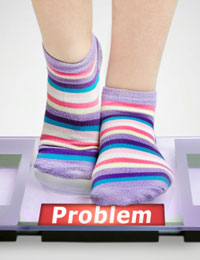
Have you hopped on the scales yet this year? Many of us, now we’re back in the swing of regular life, will be doing this, lamenting what we read there, and maybe resolving to get the number back to a more reasonable level by trying to lose weight.
There’s nothing wrong with weight loss as a goal. Just so long as we approach it sensibly, with a long-term strategy, and with a bigger picture in mind. There’s no point going on a ‘two-day sugar detox’ (I read this headline in a magazine just this morning) if at the end of it you’re going to go back to your old ways, having learned nothing about how to be healthier for life.
The bigger picture, of course, is not just losing weight, but gaining health. And the scales can’t tell you how you’re going there.
That’s why I’m a fan of abandoning the scales. Yes, even if your goal is to lose weight. The scales are not your only measure of success, and in fact, they can be a bit of a distraction from that bigger picture of gaining health.
The scales can mess with your head. If you weigh frequently, it can be easy to slip into a pattern where it’s the scale that determines how you feel about yourself. If you’ve lost weight, you feel good. If you haven’t, you blame and judge yourself for being ‘bad’. Sound familiar?
Yet weight naturally fluctuates, even in slim people. It’s entirely normal to be heavier at the end of the day than you are at the start, and exercise, hydration levels and all sorts of other things can affect your weight from hour to hour and day to day. Weighing yourself every day or every few days – and letting that set how you feel about yourself – is not helpful, and can be really demotivating.
I don’t own a set of scales, and never have. But I know I’m at my healthiest when my clothes fit comfortably; I feel energetic and not tired or lethargic; I can easily move my body and I feel strong; and my digestion is working well. These things are all good measures of health, just as much as a number on the scale.
Measuring yourself – your waist especially – is another good way to track progress. If you’re losing weight gradually and healthily, and you’re exercising regularly, you will be losing body fat and gaining muscle, so your body composition will be changing. That won’t necessarily reflect in a great loss on the scales. But your waist and other measurements could well be shrinking.
Recently I issued a challenge to participants in our HFG Kick-starters Facebook group. The group is made up of people on a weight-loss mission. I asked them to stop weighing themselves – to instead use other measures and how they were feeling to determine how they were going. Some agreed readily, and found the challenge enlightening. Others really struggled. But overall most agreed it was an interesting exercise. Try it for yourself: if you are weighing yourself any more frequently than once a week, don’t! Put the scales away in the cupboard, and judge your progress by listening to your body. Even if you just do this for one week, it’ll give you a sense of tuning into your internal cues, rather than letting something external control your progress. You might be surprised at how good you feel when you don’t let the number on the scales control you.
www.healthyfood.com










